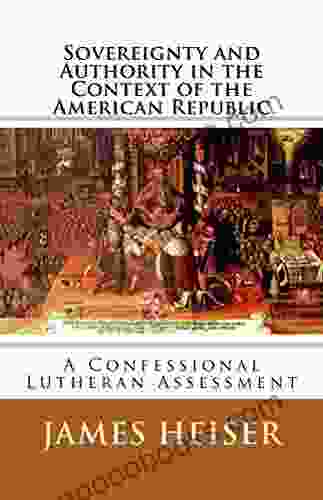Sovereignty and Authority in the Context of the American Republic

The concepts of sovereignty and authority are central to understanding the nature and functioning of any political system. In the context of the American Republic, these principles have played a pivotal role in shaping the nation's governance, societal structure, and relationship with other entities. This article aims to provide a comprehensive exploration of sovereignty and authority within the American Republic, examining their historical evolution, legal frameworks, philosophical underpinnings, and practical implications.
5 out of 5
| Language | : | English |
| File size | : | 535 KB |
| Text-to-Speech | : | Enabled |
| Screen Reader | : | Supported |
| Enhanced typesetting | : | Enabled |
| Word Wise | : | Enabled |
| Print length | : | 39 pages |
| Lending | : | Enabled |
Historical Evolution
The concept of sovereignty emerged in the 16th century as a response to the rise of nation-states and the decline of feudalism. Sovereignty is generally understood as the supreme authority within a political system, possessing the exclusive right to make and enforce laws and exercise power over a defined territory and population.
In the American context, the Declaration of Independence (1776) proclaimed the "self-evident" truth that "all men are created equal, that they are endowed by their Creator with certain unalienable Rights, that among these are Life, Liberty and the pursuit of Happiness." This declaration asserted the inherent sovereignty of the people and their right to self-governance.
The Constitution of the United States (1789) further elaborated on the concept of sovereignty. Article VI, Clause 2, known as the Supremacy Clause, establishes the Constitution as the "supreme Law of the Land" and declares that all laws and treaties made pursuant to it are binding on all levels of government and individuals. This clause firmly established the federal government's sovereignty over state governments.
Legal Frameworks
The legal frameworks governing sovereignty and authority in the American Republic are primarily based on the Constitution and its interpretations by the Supreme Court. The Constitution establishes a federal system of government, dividing power between the federal government and the states. This division of power, known as federalism, limits the authority of both levels of government and prevents any single entity from becoming too powerful.
The Constitution also incorporates the principle of separation of powers, which divides the powers of government into three branches: legislative, executive, and judicial. Each branch has its own distinct functions and responsibilities, and they are designed to check and balance one another, preventing any one branch from dominating the others.
Philosophical Underpinnings
The philosophical underpinnings of sovereignty and authority in the American Republic are rooted in the Enlightenment ideals of natural law, popular sovereignty, and limited government. Natural law holds that there is a higher law, derived from reason and nature, that governs human conduct and limits the powers of government.
Popular sovereignty maintains that the ultimate source of political authority lies with the people, who have the right to consent to and participate in their own governance. Limited government, based on the idea of a social contract, posits that the powers of government should be limited to those necessary for the protection and well-being of the people.
Practical Implications
The principles of sovereignty and authority have profound implications for the governance and societal structure of the American Republic. Sovereignty grants the federal government the exclusive power to conduct foreign policy, declare war, and regulate interstate commerce. It also establishes the nation's independence from external powers and protects its territorial integrity.
Authority, on the other hand, is the practical exercise of power by government institutions and officials. It encompasses the ability to make decisions, enforce laws, and regulate society. The division of power between the federal government and the states, as well as the separation of powers within the federal government, ensures a balance of authority and prevents the concentration of power in any single entity.
Contemporary Challenges
In the 21st century, the concepts of sovereignty and authority in the American Republic face new challenges. Globalization, technological advancements, and the rise of supranational organizations have raised questions about the traditional notions of sovereignty and the limits of state authority.
Issues such as climate change, terrorism, and cyberwarfare require international cooperation and coordination, challenging the idea of absolute state sovereignty. The rise of artificial intelligence and data surveillance technologies also raises concerns about the potential for government overreach and the erosion of individual privacy.
Sovereignty and authority are fundamental principles that have shaped the American Republic since its inception. The historical evolution, legal frameworks, philosophical underpinnings, and practical implications of these principles have ensured a balance of power, protected individual rights, and fostered a stable and prosperous society.
However, in the face of contemporary challenges, it is essential to continue to examine and adapt our understanding of sovereignty and authority to ensure that they remain relevant and effective in the 21st century and beyond. By fostering open dialogue, critical thinking, and a commitment to democratic values, we can preserve the integrity of these principles and continue to build a more just and equitable society.
References
* Akhil Reed Amar, The Constitution and American Sovereignty * John Locke, Two Treatises of Government * James Madison, The Federalist Papers * Alexis de Tocqueville, Democracy in America * Robert Dahl, On Democracy * Joseph S. Nye, Jr., The Future of Power
5 out of 5
| Language | : | English |
| File size | : | 535 KB |
| Text-to-Speech | : | Enabled |
| Screen Reader | : | Supported |
| Enhanced typesetting | : | Enabled |
| Word Wise | : | Enabled |
| Print length | : | 39 pages |
| Lending | : | Enabled |
Do you want to contribute by writing guest posts on this blog?
Please contact us and send us a resume of previous articles that you have written.
 Book
Book Novel
Novel Page
Page Chapter
Chapter Text
Text Story
Story Genre
Genre Reader
Reader Library
Library Paperback
Paperback E-book
E-book Magazine
Magazine Newspaper
Newspaper Paragraph
Paragraph Sentence
Sentence Bookmark
Bookmark Shelf
Shelf Glossary
Glossary Bibliography
Bibliography Foreword
Foreword Preface
Preface Synopsis
Synopsis Annotation
Annotation Footnote
Footnote Manuscript
Manuscript Scroll
Scroll Codex
Codex Tome
Tome Bestseller
Bestseller Classics
Classics Library card
Library card Narrative
Narrative Biography
Biography Autobiography
Autobiography Memoir
Memoir Reference
Reference Encyclopedia
Encyclopedia Scott Horton
Scott Horton Sophie Ratcliffe
Sophie Ratcliffe Rug Hooking Magazine
Rug Hooking Magazine Rue Sparks
Rue Sparks Stephen Tankel
Stephen Tankel Sheraz Hussain
Sheraz Hussain Tasha Black
Tasha Black Vanessa James
Vanessa James Stephen Mark Rainey
Stephen Mark Rainey Stephanie Taylor
Stephanie Taylor Rossana F Van Der Borg
Rossana F Van Der Borg Lisa Blackwood
Lisa Blackwood Rosecrans Baldwin
Rosecrans Baldwin Zoi A Philippakos
Zoi A Philippakos William Schemmel
William Schemmel W J Stankiewicz
W J Stankiewicz Robert E Owens
Robert E Owens Mother Bee Designs
Mother Bee Designs Linda Lael Miller
Linda Lael Miller Robert J Morgan
Robert J Morgan
Light bulbAdvertise smarter! Our strategic ad space ensures maximum exposure. Reserve your spot today!

 Avery SimmonsUnraveling the Essence of Black Beauty and Self-Acceptance: A Journey Through...
Avery SimmonsUnraveling the Essence of Black Beauty and Self-Acceptance: A Journey Through... John MiltonFollow ·4.1k
John MiltonFollow ·4.1k Bruce SnyderFollow ·13.6k
Bruce SnyderFollow ·13.6k Gregory WoodsFollow ·9.8k
Gregory WoodsFollow ·9.8k Eric NelsonFollow ·7.6k
Eric NelsonFollow ·7.6k Vernon BlairFollow ·17.7k
Vernon BlairFollow ·17.7k Herman MelvilleFollow ·18.3k
Herman MelvilleFollow ·18.3k Blake KennedyFollow ·6.7k
Blake KennedyFollow ·6.7k Alexandre DumasFollow ·17k
Alexandre DumasFollow ·17k

 Harry Cook
Harry CookRape Blossoms and White Sky: A Floral Symphony of...
A Kaleidoscope of Colors...

 Vic Parker
Vic ParkerThe Passion of Jovita Fuentes: Unveiling the...
Immerse yourself in the...

 Cormac McCarthy
Cormac McCarthySinners and Saints: A Dark New Adult High School Bully...
Sinners and Saints is...
5 out of 5
| Language | : | English |
| File size | : | 535 KB |
| Text-to-Speech | : | Enabled |
| Screen Reader | : | Supported |
| Enhanced typesetting | : | Enabled |
| Word Wise | : | Enabled |
| Print length | : | 39 pages |
| Lending | : | Enabled |
















